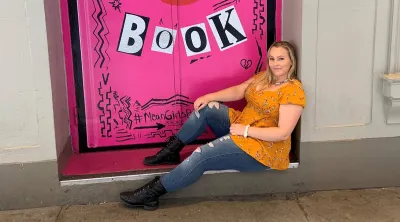Children’s mental health care: improving access and affordability in Rhode Island

There’s a serious shortage of children’s mental health care professionals, such as child psychiatrists, nationwide. In Rhode Island and other states with severe shortages, that’s made it difficult for kids like Caleigh Pearce to get the care they need. But Blue Cross & Blue Shield of Rhode Island is on a mission to break down those barriers to access.
A daughter’s mental health spirals
Caleigh Pearce grew up singing, performing in musicals and posting her favorite song covers on YouTube. But even as Caleigh embraced the spotlight, she kept another part of her life in the shadows. Caleigh says she started to harm herself before middle school. “I was feeling really sad and that kind of sent me even more into a dark hole,” she says. “It was kind of a spiraling domino effect.”
Caleigh’s parents Michele and Andy tried to help. But they found navigating the mental health system extremely difficult, even though Michele is a nurse, with training in mental health care. Michele says the family looked for the right solution for Caleigh for almost two years, all the time feeling scared and helpless. They just couldn’t find a doctor who worked for them.
“We felt like we were out in the middle of a gigantic lake by ourselves, in a boat with no paddles.”
- Michele Pearce, mother
The Pearce family was not alone.
- 1 in 5 children in Rhode Island has a diagnosable mental health issue. 1
- Diagnoses for ADHD are among the highest in the country, according to Blue Cross Blue Shield Association data.
- More than half of children between the ages of 3 and 17 have trouble obtaining the mental health care they need. 2
BCBSRI tackles long waits for children’s mental health care
Rena Sheehan, BCBSRI managing director of behavioral health, says she heard some families were waiting three to six months just to get an appointment with a child psychiatrist. She knew there just weren’t enough options for children needing mental health services. So she challenged the health plan to think differently about how to address those problems. Here are some of the steps BCBSRI took to solve the growing crisis:
- In 2019, BCBSRI dedicated more than $200,000 to expand something called the Pediatric Psychiatry Resource Network (PediPRN), which:
- helps pediatricians and primary care providers seeking additional mental health education opportunities.
- provides access to consultation with a child psychiatrist to assist in prescribing appropriate medications.
- BCSBRI also worked with child psychiatrists to keep some urgent appointment slots open for children and adolescents.
- The health plan is piloting a home and community-based program for children and adolescents that bundles all services, enabling families to make one monthly co-payment to cover multiple visits—costs that can add up when a child needs weekly or even more frequent treatment.
- Approval requirements for in-network mental health or substance use disorder services have been removed.
Children’s mental health specialists see a difference
Karyn Horowitz, MD, director of Outpatient Child Psychiatry & Behavioral Health Services at Lifespan, a major hospital system in Rhode Island, says the result of so many creative initiatives is making a difference, with more kids getting better while using fewer resources. “It’s great to have a partner like BCBSRI who really cares about these children and families and saw how it was a good business plan,” she says. “They put those two together to do what was right.”
Finding the right mental health program changed Caleigh’s life
The combination of initiatives paid off for Caleigh Pearce and her family. Rather than trying one doctor after another to find the right fit, they enrolled in a program called Mindful Teen at Bradley Hospital, a children’s behavioral health hospital in Providence. It’s an 18- to 24-week outpatient program for teens struggling with suicidal thoughts or behavior. Patients learn how to manage their emotions. Families are part of the program as well.
BCBSRI offers the program as part of a continuum of services to help adolescent members with complex mental health needs. The health Plan’s single, affordable co-pay for the program means that members don’t have to pay each time they attend outpatient treatment.
Michele Pearce says she believes the family-based concept was the key to success. She says she’s grateful to have found “people who were willing to work with us to get us where we needed to go.” Caleigh graduated from the Mindful Teen program in 2017. Today, she says she’s healthy and happy. She’s focused on friends, school, a job, and—of course—singing.
Blue Cross & Blue Shield of Rhode Island is an independent licensee of the Blue Cross Blue Shield Association, an association of independent, locally operated Blue Cross and Blue Shield companies.
1,2 Rhode Island Kids Count Factbook, 2018
